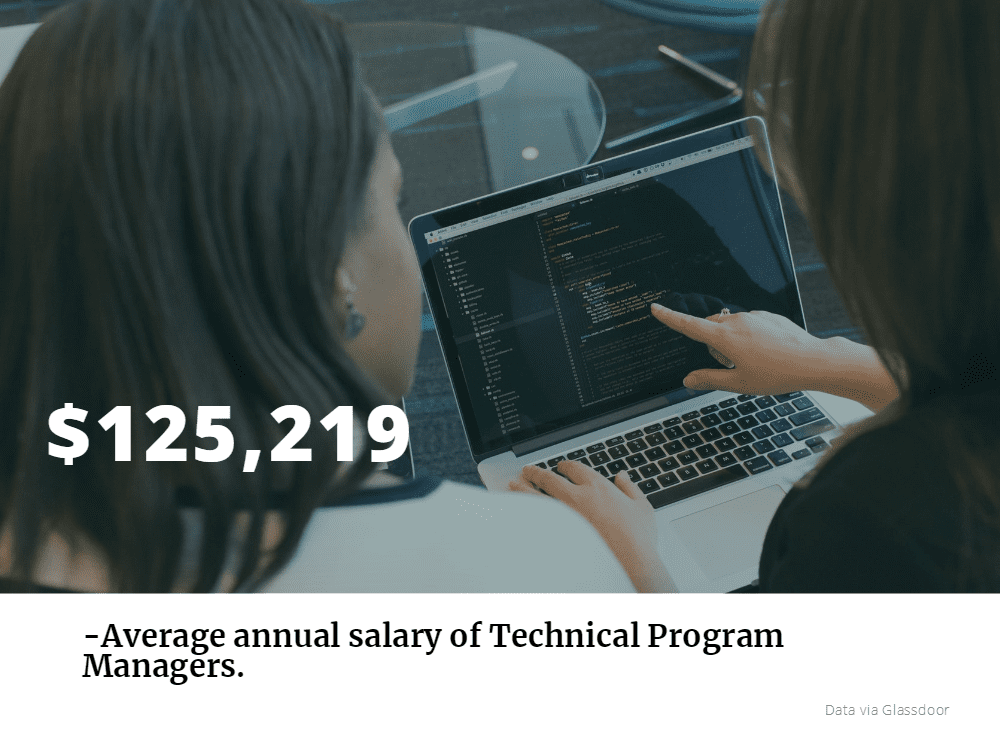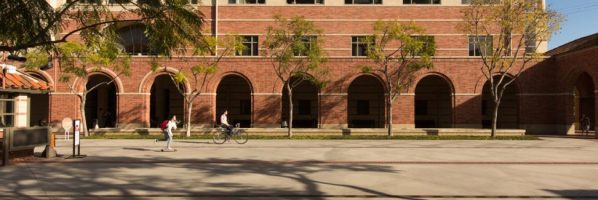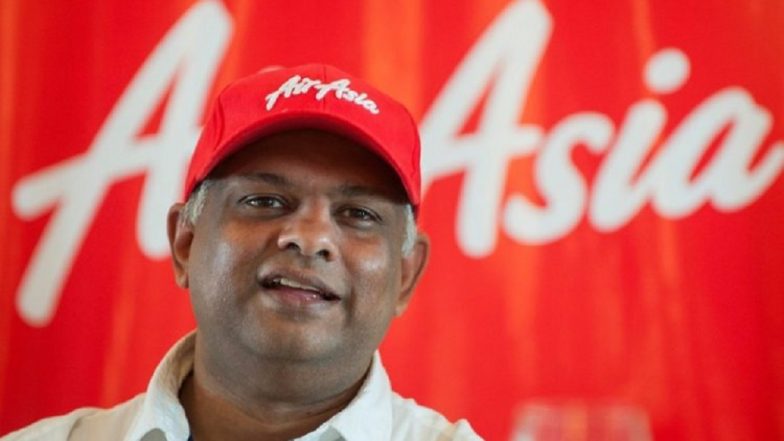MBA Job Profile: Technical Program Manager

Most successful businesses involve many moving parts. To coordinate personnel and logistics in a rapidly evolving technological landscape requires large teams of individuals and a solid technical background. This is precisely where technical program managers come in handy: they steward all aspects of a program from initiation to implementation.

What is a Technical Program Manager?
Technical program managers handle company technical needs, leading teams in product development and software implementation. They ensure that deadlines are met, and any technical issues are swiftly resolved. This requires the marriage of two traditionally unrelated skill sets—personnel management and technical proficiency.
Since every business has unique technical needs, the specific skills required may vary from company to company. However, there are certain elements that hold true regardless of a company’s specific focus. The most important attributes of an aspiring technical program manager are an acute intuition for leadership, the ability to adapt, and a keen sense of the inherent logistical needs that arise from the combination of these two areas.
Technical program managers aren’t just required to oversee projects; they must also be diligent in tracking issues within the programs they manage and successfully troubleshooting them. They are also required to utilize their expertise to assess the large-scale technical needs of a company and initiate programs accordingly. This requires the identification of all action items necessary for a program’s success as well as schedule and budget development.
Technical Program Manager Salary Expectations
According to Payscale, the median income for technical program managers is $121,627, while Glassdoor cites the average salary at $125,219. Generally speaking, experience affects pay. Technical program managers with less than one year experience earn around $90,000. Those who have been working for over 20 years earn approximately $132,000.

Infosec, an institution that offers educational resources focused on cybersecurity, offers different statistics that are less optimistic. It quotes the national average salary for technical program managers as $89,000 a year. Less experience managed often make $71,000. Senior-level managers typically see around $99,000 per year. Those in urban areas are likely to receive a higher salary than those in less densely populated areas.
However, Infosec is quite optimistic about the future for aspiring technical program managers. It estimates that number of positions will grow by roughly 15-20 percent over the next eight years.
Getting Started
Becoming a technical program manager means having at least a bachelor’s degree in fields like management, business administration, or computer science. Some businesses might hire someone who does not have a bachelor’s degree if they do have prior experience working in a related field. Naturally, if you have both experience and a relevant bachelor’s degree, or an advanced degree, you will stand out to potential employers.
Typically, this means earning an education in an engineering school, rather than a business school. However, business schools offering dual degrees can help provide a path for future technical program managers.
For instance, Harvard Business School offers a MS/MBA option. Earning an MS/MBA from the world’s most well-known academic institution means having world-class career preparation, leading to a similarly world-class career. Harvard MBA graduates, in general, can expect an average annual salary of around $140,000—and that’s before one takes signing bonuses and other benefits into account.

Many of the world’s best business schools, like HBS, offer special dual degree MBA programs for hopeful technical program managers.
Friday News – USC Marshall Announces New Dean, HBS Receives Gift for Dual Degree, and More

Let’s take a look at some of the biggest stories from this week, including the newest USC Marshall dean.
Geoffrey Garrett Named New Dean of USC Marshall School of Business – USC Marshall News
The USC Marshall School of Business announced its newest dean, Geoffrey Garrett, formerly of the Wharton School at the University of Pennsylvania. Garrett, an economist and political theorist, begins his tenure in 2020.
President Wanda M. Austin says of Garrett’s appointment, “He has a demonstrated track record in global business theory and practice, which aligns with our mission to create the leaders of the future … Marshall School of Business has found a tremendous leader in Geoffrey Garrett.”

Geoffrey Garrett is set to begin his USC Marshall dean tenure next year.
Along with serving as Wharton’s dean, Garrett is also the Reliance Professor of Management and Enterprise, and he formerly taught political science there. Prior to his positions at Wharton, he served as dean of the University of Sydney and the University of New South Wales. His appointment at Marshall will not be the first position he has held at USC, however. He also taught communications, international relations, law and business in 2005.
Garrett says, “My first year will be all about listening and learning … I think I have a pretty good appreciation for the world of business and education and for what USC Marshall has achieved. But the DNA of the school is its people, and I have so much to learn from them and about them.”
Read here for more about the newest USC Marshall dean.
HBS and SEAS Announce Gift of Financial Aid to Support Joint Degree Program Students – Harvard SEAS News
A generous gift from two alumni has contributed to the growth of the MS/MBA joint degree program at Harvard University. Denise Dupré and Mark Nunnelly, both 1984 MBA graduates, have given the needed support for a financial aid program for students who are pursuing the dual degree. The MS/MBA program launched in 2018, and it has served to unite HBS and the Paulson School of Engineering and Applied Sciences (SEAS).
Twenty-nine students are enrolled in the MS/MBA’s inaugural program, whose curriculum focuses in equal part on technology, design, and business and management principles.
Nitin Nohria, Harvard Business School Dean, says:
“This generous gift will support future leaders who will bridge the worlds of business and engineering, spurring innovation and the commercialization of new discoveries to address many of society’s most exciting opportunities … The expansion of SEAS to [the Allston campus] is a catalyst for collaboration that will propel and transform teaching and research at Harvard for decades to come.”
The expansion of Allston was a major catalyst for Dupré and Nunnelly’s gift. “We’ve both been enormous fans of the possibilities in Allston for many years,” says Nunnelly. “It’s so incredibly important to the future of Harvard, the city of Boston, and the entire state of Massachusetts.”
For more on the MS/MBA and the Allston expansion, read here.
Calculating New Ideas – Fox School of Business Idea Marketplace
A statistician and associate professor at Temple University’s Fox School of Business has made great strides in data science with a pair of new developments that will likely be game changers in healthcare and education.
Zhigen Zhao, along with his colleagues, have discovered a way to calculate health risks by studying interactions between human genes. The team developed an algorithm which will analyze 20,000 genes at a time (twice the number of previous methods), which may help doctor’s to determine a patient’s risk for such things as Alzheimer’s, alcoholism, and obesity.
“Our method only takes two-tenths of a second to finish this kind of calculation,” Zhao says. “People’s health can depend on a specific combination of their genes.”
Another breakthrough algorithm Zhao and his team created will help to bridge the divide in standardized test scores between advantaged and disadvantaged students. With the new tool, the team parsed the test results collected from various schools to create a more thorough picture of who was doing well on which tests.
“The main idea for this method is to incorporate school district information to get a new threshold … The standard method, which doesn’t include this information, can be either overly conservative or overly liberal.”
Read here for more on Zhigen Zhao and his team’s work.
Career Changer’s Investment in Master’s Program Has Big Payoff – Rutgers Business School News
Julie Mitchell, a graduate of the Rutgers Business School Online Master of Science in Supply Chain Management program, managed to launch a new and more profitable career even amidst the daily challenges of family and work.
Mitchell is Senior Procurement Agent in Supply Chain Management for Boeing, where she manages every aspect of equipment delivery to create 737 galleys. She has been with Boeing for five years, and in that time her salary has increased by 83 percent. “The degree catapulted me into a senior procurement agent position,” she says. “There are people who have waited 10 years for that to happen.”

Julie Mitchell, Rutgers online Maser of Science in Supply Chain Management alum / Photo via business.rutgers.edu
After a decade plus long career of managing a dental practice, Mitchell decided to take a job at Boeing where she discovered her talent for managing billing, logistics, and operations. Several experiences led her to further hone in on her natural ability for ‘disruption management,’ and from there she earned her degree.
“I like to be challenged and I like fixing problems. A 737 has 400,000 parts, including nuts and bolts. It can be like working on a puzzle. The most rewarding thing is delivering something to a customer that they’re happy with.”
For more on the online Master of Science in Supply Chain Management at Rutgers, read here.
Top MBA Recruiters: IDEO

If you’re interested in international design and consulting, IDEO (pronounced eye-dee-oh) should be on your radar. Launched in Palo Alto, CA in 1991, the company is known for using design-thinking methodology to design its products, services, environments, and digital experiences. They’re involved in a wide range of consumer products (toothbrushes, computers, personal assistants, etc.) experiences (non-traditional classrooms), as well as management consulting and organizational design.
Known for designing the first manufactured mouse for Apple, IDEO leads the way for human-centered design. As their website says, “IDEO has long been at the forefront of creating change through design.” Continue reading…
By the Numbers: The World’s Most Valuable MBA

There are many different ways to define “lucrative”—so when trying to find the world’s most valuable MBA degree, there are a few different metrics you can use to draw a conclusion. Lucky for us, the new Financial Times global MBA ranking manages to list the world’s top MBA programs in (almost) every way imaginable, including highest weighted salary, salary increase, and value for money. Sounds lucrative to me! Continue reading…
Beyond the ‘Big Four’: What are the Other Major Consulting Firms You Should Know?

Deloitte, PwC, KPMG, and E&Y: Together these firms make up the “Big Four”—the four biggest professional services firms in the world. The companies offer auditing, assurance services, management consulting, corporate finance, legal services and more. It’s no surprise, that many of these companies are also ideal destinations for many MBAs. Continue reading…
The Future Time Slack Phenomenon, and More – Boston News

Let’s review the most interesting stories to emerge from Boston business schools this week, including a Harvard professor’s explanation of what exactly “future time slack” is and why you may be dealing with it on a regular basis.
Time For Happiness: Why the Pursuit of Money Isn’t Bringing You Joy—And What Will – Harvard Business Review
New research shows that even if an employee receives a promotion or raise they covet, they may feel just as discontented. Regardless of the outcome of our efforts, we all feel increasingly strapped for time, and often the things that we believe will make us happy—and that we work so hard for—don’t.
Evidence shows that “time affluence” i.e. the feeling of having enough time is at a record low in the United States. Ironically, despite the perception that people today work longer and harder, data shows that most of us have more discretionary hours than ever before. Yet we still feel starved for time.
Harvard Business School Assistant Professor Ashley Whillans writes, “In a study of nearly 40,000 Americans, when people made time-saving purchases on Saturday or Sunday (versus those who did not), they spent about 30 minutes more socializing with friends and family. That in turn promoted greater end-of-day happiness. The people who made those purchases were happier not only because they socialized more but because they derived greater joy from doing it.”
Whillans notes the behavioral factors that affect our decisions to choose money or time. “We suffer from something called future time slack—the belief that we’ll have more time in the future than we do in the present. So, we decide to make some sacrifices now with the promise of enjoying more time later. Of course, when the future comes, we don’t have more time. We just repeat the same mistake.”
You can read more about Whillans’ research here.
Expert Witnesses: Accounting and MBA Students Testify in Court – Sawyer Business School
In the Suffolk Law School Moot Courtroom, lawyers deposed Accounting and MBA students in a simulated embezzlement case. This marked the culmination of a semester of students interviewing a plaintiff and a defendant, gathering evidence, writing memos and reports and crunching numbers to determine how much money had been stolen from a fictional company.
As one student after another took the witness stand, the plaintiff’s attorney, Accounting Professor Martino Coviello, BSBA ’97, MSCJ ’04, and the defense attorney, Walter Nelepa, JD ’12, put them through lines of questioning.
Professor Coviello described the reasoning behind this simulation:
“A forensic accountant needs to keep a mindset that everything he or she does will, at some point, be scrutinized in a courtroom. So students need to understand not only courtroom procedures, but also withstand the scrutiny of a defense attorney. It never really clicks until you’re actually in a courtroom.”
Coviello notes how the courtroom simulation has a recognizable impact on the students abilities to recall and stand by their investigation. “You might have missed a date on a memo or you might have misplaced your notes, and that doesn’t seem like a problem until you’re in a courtroom and a defense attorney makes a big deal out of it.”
“He’s trying to instill doubt in the minds of the jurors by asserting that if you made a mistake on that stuff, then you must have made a mistake elsewhere in your investigation,” Coviello says.
You can read more from the article here.
Why AirAsia Boosts Marketing During a Crisis – MIT Sloan Ideas That Matter
Tony Fernandes, CEO of AirAsia recently spoke at MIT Sloan to share lessons learned about finding opportunity in adversity and building a culture around people.
Fernandes purchased AirAsia back in 2001 when the airline was $11 million in debt, turning it around to become the world’s best low-cost airline. AirAsia has weathered a range of disasters since Fernandes took charge, from 9/11 to the severe acute respiratory syndrome (SARS) outbreak, bird flu, high oil prices, and a currency crisis. Instead of panicking, Fernandes pays a visit to his advertising department. In fact, during the SARS outbreak, Fernandes tripled AirAsia’s advertising.

Tony Fernandes, CEO of AirAsia, bucked traditional trends, increasing spending during times of financial crisis, often to the company benefit.
Fernandes remarked, “Most companies cut marketing during a crisis, which is actually a huge mistake. Adversity is a great time to build a business.”
Fernandes adds that it’s important to remember that it’s always people who are the key to a company’s success, and that he is working to create a culture that reflects that.
“I probably spend 50 percent of my time walking around the office, because I think management by walking around is critical. Never lose sight that your biggest asset is the people in your organization. It’s not all about you—it’s about the whole team.”
You can read more about Fernandes and his visit to MIT here.
